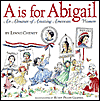|
A Is for Abigail

Last updated Tuesday, February 22, 2005
Author: Lynne Cheney
Illustrator: Robin Preiss Glasser
Date of Publication: 2003
ISBN: 0689858191
Grade Level: 3rd (GLCs: Click here for grade level guidelines.)
Date(s) Used: Mar. 2005
Synopsis:
(from the publisher)
"A" is for Abigail Adams, who knew that women should be heard.
"B" is for Elizabeth Blackwell and others who wanted to heal.
"C" is for Evelyn Cameron and the women who went west.
"D" is for Emily Dickinson, our country's greatest poet.
In America: A Patriotic Primer, Lynne Cheney, senior fellow at the American Enterprise Institute and wife of Vice President Dick Cheney, introduced the founding principles of our country to our nation's youngest citizens. Now she brings America's children and families the stories of the many great women who are part of our history and our lives. Spanning our time as a nation, her latest book is filled with details to pore over and discuss in a celebration of the diversity, tenacity, and ingenuity of American women. With the letters of the alphabet as an outline, each page is illustrated in words, through quotations from historical sources; and in pictures, through exuberant and detailed drawings by renowned illustrator Robin Preiss Glasser.
With each letter of the alphabet you can discover the stories -- told and untold -- of the amazing women of our country.
| Note to readers: |
| • |
This book is not a story that can be read from beginning -- there is a lot of information on each page. Don?t feel constrained to read every bit, or to read it in order. You may want to ask the children what letter their first name starts with, and go to that letter, or talk about what jobs they know about, and go to an appropriate page.
|
| Discussion topics for before reading: |
| • |
What do you know about Abigail Adams? Any of the other women?
|
| • |
Are there jobs that women can?t do? Why or why not?
|
| • |
Name inventors, scientists, politicians, businesspeople, artists, other famous people, etc., that you have heard of (men and women). List them on the board. (Later compare to women discussed in the book).
|
| Discussion topics for during/after reading: |
| • |
Name a woman you look up to. Why do you look up to her?
|
| • |
What are some characteristics of these women that helped them succeed.
|
| • |
What do you want to do as a job when you become older?
|
| • |
With any of the women, is there someone you know that has benefitted from what they have done?
|
| Craft ideas: |
| • |
What do you want to be when you are older? Design a page in the book for you.
|
| • |
Like the first page, or the page for the letter Q, make a quilt out of your favorite or most inspiring women.
|
| • |
Design a postage stamp commemorating one of the women you have learned about.
|
| • |
Make a portrait of an important woman in your life, and write why she is special.
|
| Special activities: |
| • |
Make a group chain for the classroom with paper loops from each child featuring a favorite amazing woman.
|
*Note: These craft ideas are just suggestions.
You can use them, but you don't have to use them.
You can expand upon them, or add your own twist.
Remember, though, that the focus of your time should
not be on the development and execution of a craft;
the focus should be on the read-aloud and the
enjoyment of the book!
|
